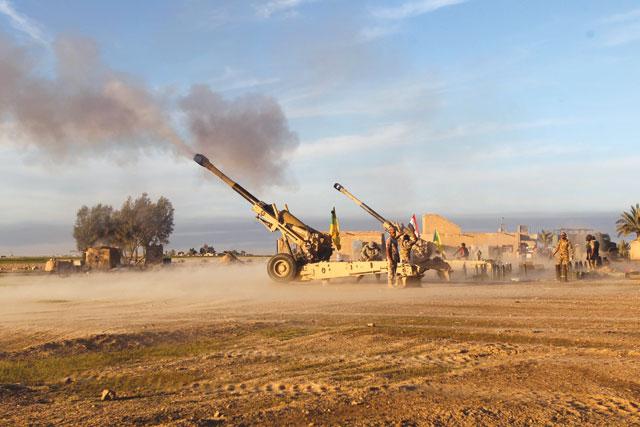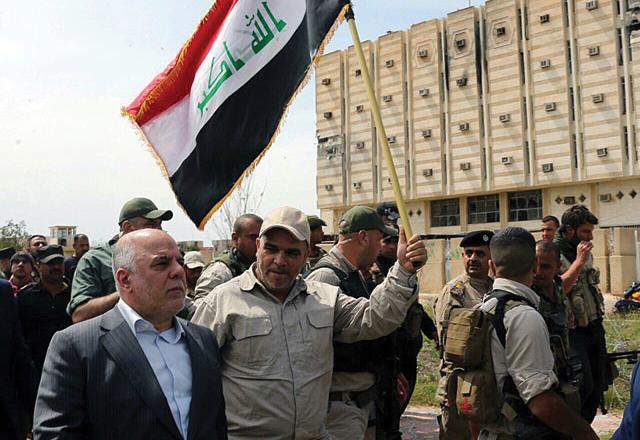You are here
Wary Iraq forces tighten noose on Daesh in Tikrit
By AFP - Mar 12,2015 - Last updated at Mar 12,2015

ALBU AJIL, Iraq — Thousands of Iraqi troops and militiamen laid siege to jihadist fighters holed up in Tikrit on Thursday, wary of rushing into streets littered with bombs and infested with snipers.
After making major gains in and around the city on Wednesday, commanders were confident that Baghdad's biggest victory yet against Daesh terror group was only a matter of time.
"Now we are moving to the second phase of our plan," Defence Minister Khaled Al Obeidi told reporters in Salaheddin province, of which Tikrit is the capital.
"We are very keen for our losses to be as low as possible. Time is on our side, we have the initiative," he said on the 11th day of the offensive.
None of the fighting forces involved has provided casualty figures since the start of the operation to wrest back Tikrit, the largest since Daesh captured the city nine months ago.
Dozens of bodies are being driven south to Baghdad and the Shiite holy city of Najaf almost every day, however, and, while government forces have had the upper hand, Daesh has done damage with suicide car bombs, booby traps and snipers.
"We don't want to be rushed because we want to avoid casualties," police Staff Major General Bahaa Al Azzawi told AFP in Albu Ajil, a village from which Tikrit can be seen across the Tigris River.
"Tikrit is sealed off from all sides," he said.
All towns and villages on the eastern bank of the Tigris were under the control of anti-Daesh forces Thursday, including Al Alam, Albu Ajil and Ad-Dawr.
Black and white Daesh flags painted on walls had been graffitied over with slogans cursing the jihadist group or praising Shiite militia groups.
Tikrit is on the west bank and, until military engineering units throw floating bridges across the river, the nearest bridge Iraqi forces can use is in Samarra, nearly 50 kilometres to the south.
Troops and police as well as volunteers from the Popular Mobilisation units moved deep into the northern half of Tikrit on Wednesday and finished securing outlying areas.
Sunni tribes fighting
Tikrit was the hometown of executed leader Saddam Hussein, whose Baath Party collaborated with the jihadists when they took over almost a third of the country last June.
With crucial military backing from neighbouring Iran and a 60-nation US-led coalition, Baghdad has rolled back some of the losses.
It started with operations to secure the Shiite holy cities of Karbala and Najaf and bolster Baghdad's defences, then worked its way north, retaking Diyala province earlier this year.
Commanders see the recapture of overwhelmingly Sunni Arab Tikrit as a stepping stone for the reconquest of Mosul further north, Iraq’s second city, which once had a population of two million.
Analysts say the battle for Tikrit is also a key test of how well the regular army can work with the myriad of militia groups and prevent reprisal attacks against Sunnis.
The defence minister, who is himself Sunni, said he was impressed with the level of cooperation and played down concerns that victory in Tikrit could further alienate the minority community.
“What caught my attention and was very positive, was that I met a number of fighters, maybe more than 250, who are all sons of Tikrit,” he said.
“It sends a very positive message to the Iraqi people and lifts the spirit of the security forces,” Obeidi said.
Concern for civilians
Prime Minister Haider Al Abadi too hailed the advances made by government forces when he spoke to students at a technology institute.
“With our unity we achieve victory and the greatest example of this is today in Salaheddin and Anbar,” he said.
Daesh launched a spectacular attack on the government-held heart of Anbar’s capital Ramadi on Wednesday, using at least 12 simultaneous car bombs.
Seventeen people were killed, mostly members of the security forces, in addition to a minimum of seven suicide bombers.
An Australian teenager was reportedly one of the bombers, something which Prime Minister Tony Abbott on Thursday described as “absolutely horrific”.
With Iraqi forces choking jihadist fighters hunkered down in Tikrit’s smouldering centre, it was unclear how many civilians might still be trapped there.
Shiite militia leaders had warned before the offensive began that it would be an opportunity to mete out revenge for the massacre by Daesh in June of hundreds of military cadets at a nearby base called Speicher.
They have since publicly urged their men to refrain from any acts that could tarnish a victory, and relatively few reports of abuses have surfaced in nearly two weeks.
However, Amnesty International cautioned it was still too early to tell if Tikrit had been a cleaner operation than usual.
“For now access to combat areas is restricted and information about abuses may take time to filter out,” the rights group’s senior crisis response adviser Donatella Rovera told AFP.
Related Articles
Iraqi security forces and Shiite militia fighting Daesh terror group took control of the centre of a town on the southern outskirts of Saddam Hussein's home city Tikrit on Sunday, security officials said.
Iraq vowed Wednesday to reclaim the entire country from jihadists after having liberated the city of Tikrit, its biggest boost yet in the fight against Daesh terror group.
Daesh militants have set fire to oil wells northeast of the city of Tikrit to obstruct an assault by Shiite militiamen and Iraqi soldiers trying to drive them from the Sunni Muslim city and surrounding towns, a witness said.


















